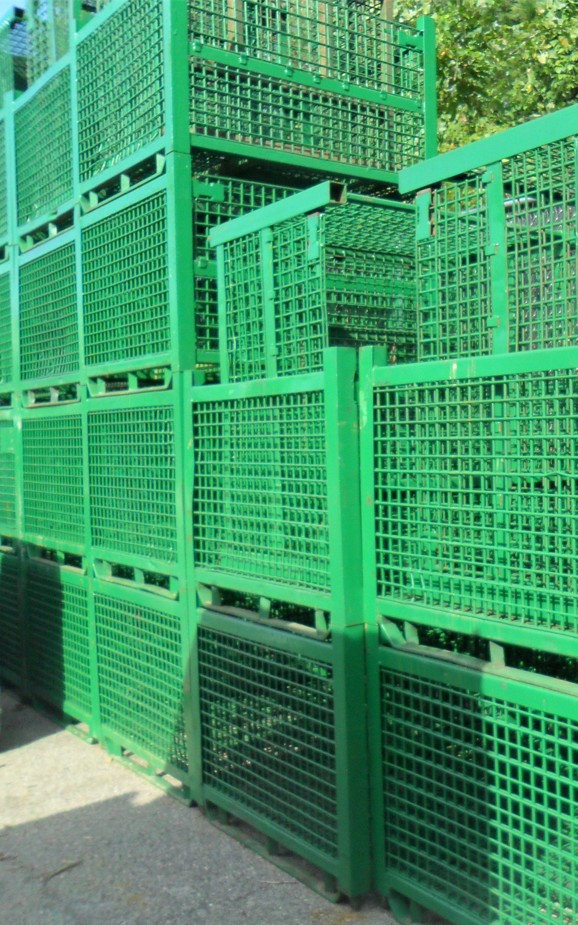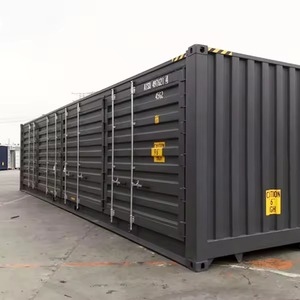The Ultimate Guide to Picking the Right Bulk Containers for Your Company Requirements
Choosing the ideal bulk containers is crucial for any kind of organization that depends on effective logistics. Numerous kinds of containers exist, each designed for certain materials and applications. Elements such as dimension, material compatibility, and governing criteria play a substantial role in this decision-making process. Recognizing these elements can bring about improved functional performance. Nevertheless, lots of services forget vital elements that can enhance their total efficiency and sustainability. What are these considerations?
Understanding Different Sorts Of Bulk Containers
Bulk containers work as essential devices for companies seeking efficient storage space and transport remedies. These containers come in numerous types, each designed to meet certain operational requirements. One typical kind is the intermediate bulk container (IBC), which is ideal for liquid and granulated materials, supplying a balance of capacity and maneuverability. One more popular choice is the mass bag, or FIBC, appropriate for completely dry, flowable products. These adaptable containers are lightweight and can be easily transported and stored. For heavier products, stiff mass containers are often used, offering toughness and security for secure handling. Furthermore, there are customized containers customized for unsafe materials, ensuring conformity with security policies. Recognizing the distinct characteristics of these mass container types allows organizations to make educated decisions that enhance logistics and minimize expenses. By picking the best container, business can enhance their functional effectiveness and improve their supply chain processes.
Key Material Considerations for Bulk Containers
When picking bulk containers, it is important to contemplate the materials used in their construction. Aspects such as chemical, toughness, and resilience compatibility play an important role in making sure the containers fulfill specific functional demands. Additionally, weight and transportability worries can impact both performance and transport logistics.
Material Durability and Stamina
Durability and toughness are critical factors in selecting materials for bulk containers, as they straight influence the container's ability to hold up against numerous ecological conditions and handling processes. Products such as high-density polyethylene (HDPE), polypropylene, and stainless-steel are commonly preferred for their robust residential properties, providing resistance to abrasion, temperature, and impact variations. The option of material also influences the total lifespan of the container; more powerful materials typically result in less regular substitutes, causing set you back financial savings in time. Additionally, the weight of the material can affect shipping prices and convenience of handling. Companies must consider their certain functional settings and the possibility for deterioration to guarantee peak sturdiness and stamina in their bulk container selection.
Chemical Compatibility Variables
Recognizing chemical compatibility is vital for choosing bulk containers, as the materials made use of have to resist the certain substances they will certainly hold. Numerous aspects affect compatibility, including the chemical nature of the contents, temperature, and period of storage space. Destructive chemicals may require containers made from stainless steel or specialized plastics that withstand deterioration. In addition, responsive materials can create warm or gases, necessitating aired vent or pressure-rated containers. The choice of container product, whether polyethylene, metal, or polycarbonate, must align with the chemical homes of the saved substances to stop leaks or violations. Eventually, a thorough examination of these compatibility aspects ensures secure handling and storage, securing both workers and the environment while preserving product honesty.
Weight and Mobility Issues
Picking mass containers entails not only reviewing chemical compatibility yet additionally considering weight and mobility. Companies should evaluate the ease of handling and transport to maximize effectiveness. Light-weight products like high-density polyethylene (HDPE) or light weight aluminum can help with easier motion and lower shipping prices. On the other hand, larger containers might supply boosted longevity but can impede flexibility, especially in atmospheres needing frequent moving. In addition, the style of the container ought to enable convenient training and piling, ensuring ergonomic safety and security for workers. Companies need to likewise take into consideration the framework readily available for transport; as an example, containers compatible with forklifts or pallet jacks can enhance operations. Eventually, the appropriate balance in between weight and mobility straight influences operational performance and expense performance.
Sizing Your Mass Containers for Ideal Performance
When sizing bulk containers, companies need to very carefully examine the dimensions called for to fit their certain products. Furthermore, weight capability is a crucial aspect that influences performance and safety throughout transportation and storage space. Effective sizing not only makes the most of room however additionally enhances operational process.
Establishing Container Dimensions
Choosing the ideal measurements for bulk containers is vital for maximizing performance in storage and transport. Businesses have to analyze their particular needs, thinking about aspects such as readily available area, the nature of the items being kept, and the methods of transportation made use of. Precise measurements guarantee that containers fit preferably in cars and storage facilities, decreasing squandered area and minimizing dealing with time. Criterion dimensions can use ease, but custom measurements could be essential for one-of-a-kind demands or to suit particular items. In addition, it is necessary to assess stacking abilities and availability, as these factors influence overall operational effectiveness. Eventually, the right dimensions bring about enhanced company and streamlined logistics, benefiting the overall efficiency of business.
Weight Ability Considerations
Recognizing weight ability is essential for businesses intending to enhance their bulk container effectiveness. The weight ability of a container directly impacts storage space capacities, transportation logistics, and overall operational prices. Picking containers with the proper weight restrictions guarantees that businesses can safely store and transport their goods without running the risk of damage or compliance problems. Overwhelming containers can cause architectural failures, while underutilizing capability lead to lost resources. It is essential for services to examine their product weights and consider any regulative demands when picking containers. In addition, elements such as the sort of material, intended usage, and environmental problems must additionally influence weight ability decisions. By examining these elements, companies can enhance performance and ensure a streamlined supply chain.
Regulative Conformity and Safety Standards

Regulatory conformity and security criteria play an important function in the option of mass containers for businesses. Organizations should guarantee that their containers fulfill numerous laws established by local, nationwide, and international authorities. These standards frequently relate to product security, structural stability, and appropriate labeling, which aid prevent crashes and assure the secure transportation of items.
Furthermore, adherence to industry-specific standards, such as those from the Fda (FDA) or the Occupational Safety And Security and Health Management (OSHA), is critical for companies managing hazardous products or foodstuff. Non-compliance can lead to fines, lawful issues, or damages to an organization's credibility.
Services must also think about the container's compatibility with the products being stored or transported to stay clear of contamination or chain reaction (used collapsible bulk containers). To summarize, comprehending and executing regulatory conformity and safety and security requirements is important for the efficient and responsible use of mass containers
Sustainability Alternatives for Eco-Friendly Bulk Containers

Firms are also discovering options made from recycled materials, which not just save resources but also support the recycling sector. In addition, developments in style enable for lighter containers that need much less power to transport, even more improving sustainability. By integrating these environment-friendly bulk container options, organizations can demonstrate their dedication to environmental stewardship while fulfilling consumer need for sustainable techniques. This shift not just helps the planet however can also improve brand reputation and consumer loyalty.
Cost-Effectiveness and Budgeting for Mass Containers
While several organizations concentrate on sustainability, cost-effectiveness stays a critical element when choosing mass containers. Organizations has to analyze the preliminary acquisition rate, in addition to long-lasting functional costs, to guarantee economic stability. Aspects such as reusability, toughness, and maintenance play a considerable duty in determining total expenses.
Investing in premium containers may produce higher ahead of time costs yet can lead to savings through decreased substitute rates and reduced waste. Furthermore, services must take into consideration transportation costs and storage performance, as these can influence the general budget.

Frequently Asked Concerns
Just how Do I Establish the Right Container for Hazardous Materials?
To establish the appropriate container for hazardous products, one have to evaluate compatibility with the compound, consider the container's product, check for regulatory compliance, and analyze capacity and safety and security features to ensure appropriate handling and storage.
Can Bulk Containers Be Personalized for Particular Products?
Yes, bulk containers can be tailored for details items. used plastic containers. Various features, such as dimension, product, and design, can be tailored to satisfy one-of-a-kind demands, making certain excellent safety and security and efficiency for carrying and storing different items
What Is the Average Life Expectancy of Different Mass Container Kind?
The ordinary life expectancy of mass container kinds differs; plastic containers last 5-10 years, metal containers 10-20 years, and wooden containers generally last 3-7 years, depending upon usage, upkeep, and ecological conditions.
How Should I Clean and Maintain Bulk Containers?
To clean up and keep bulk containers, one should regularly inspect for damage, get rid of residue, laundry with appropriate detergents, wash thoroughly, and warranty correct drying prior to storage. Complying with maker guidelines enhances durability and safety during usage.
Are There Rental Choices for Bulk Containers Available?
Yes, countless companies provide rental alternatives for mass containers, giving adaptability for companies. These services can suit various requirements, allowing business to take care of supply successfully without the dedication of acquiring containers outright.
Resilience and toughness are critical aspects in selecting materials for bulk containers, as they directly influence the container's capacity to stand up to different ecological problems and managing procedures. Understanding chemical compatibility is necessary for selecting bulk containers, as the products made use of need to withstand the details compounds they will certainly hold. Understanding weight capability is essential for businesses intending to enhance their mass container effectiveness. Governing conformity and safety and security standards play a necessary role in the choice of mass containers for organizations. While several services concentrate on sustainability, cost-effectiveness continues to be a vital variable when choosing mass containers.